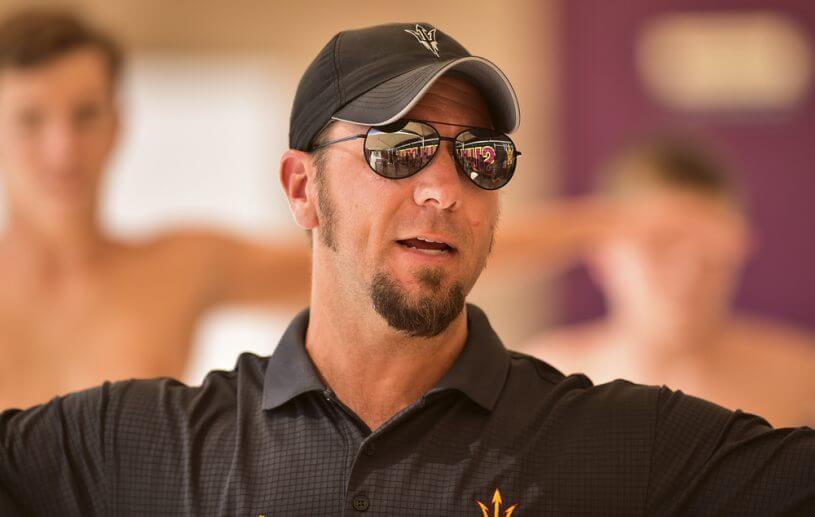Don’t Call it a Taper

By Alec Scott, Swimming World College Intern
“When people think of the word taper, they think of everything under the sun,” Arizona State Associate Head Coach Ryan Mallam said.
Think about it, how many unnecessary superstitions and external factors athletes worry about when “tapering.” Athletes start to become result-oriented instead of focusing on the process that will actually help them toward putting together great performances. Coach Mallam has never been a fan of the word, he prefers to use the term, “rest cycle.”
“During a rest cycle the work load is dropping but you’re still going to be doing some work,” Mallam said. “Your focus shifts to details, like working on a better pullout, or a faster breakout, really just sharpening race skills that you’ve already been working on.”
Most tapers have similar elements like race pace work, more skill work, breath control, but the word has come to mean so many other things that don’t really have any impact on how fast an athlete can swim. There’s no real reason to be worried about taking the trash out to the curb or going up a flight of stairs to a class but we do it because the nature of swimming is to put a lot of pressure on a few meets to swim fast. Athletes want to do everything right so they get preoccupied with factors that they can’t control.
“Taper is a word that lends itself to these superstitions that really don’t mean that much,” Mallam said. “People think, ‘I didn’t rest enough,’ ‘I rested too much’ or things like ‘I shouldn’t go up these stairs.”
Swimmers also tend to have this idea that when they rest they have an extremely small window for success. Thinking that a few days here or there can make or break a rest cycle gives credence to the idea that successful tapers don’t happen very often.

Photo Courtesy: Erin Marsteller
“Realistically, if you work hard at the beginning of the year, you should be able to rest for a long time,” Mallam said. “Obviously it’s going to vary athlete to athlete, but when you think about it in the context of a seven or eight month season, a few weeks for a rest cycle is not that much.”
You should be confident in the work that you have done to put you in a position to succeed. Rest should be about building your confidence, not fretting over small details that you can’t control.
“A lot of rest is just about building confidence, and using a general word like taper tends to get people to worry about factors that they can’t control, which definitely isn’t going to help their confidence.”
Confidence might be the most important factor in deciding whether or not a taper is going to be successful, if you are confident, there is little else that can bother you. That idea of a small window for success comes from stress about the perceived quality of a taper.
Take it from one of the best coaches in America, there’s no reason to stress yourself out over the little things you can’t control that have come to be associated with the word, “taper.”
All swimming and dryland training and instruction should be performed under the supervision of a qualified coach or instructor, and in circumstances that ensure the safety of participants.




I have used “final preparation” for years and agree with you.
Grant House
Couldn’t agree more!
I agree
Mo Trattner
Joe Stott
Jaden Harris
“I call it a rest cycle.” “People get caught up in the word taper thinking ‘I didn’t rest enough.'”
I would think calling it a rest cycle would do more to falsely promote what the process is. Ultimately, it’s ALL semantics. What you call it doesn’t matter as much as how you define it. We could call it whatever we want as long as the swimmers are doing what their coach believes is necessary for their swimmers.
yes, i agree with your premise: how you define a word matters, but most people have a “hindrance” in their life called “head psychology” i.e. wherin they may get bogged down (overwhelmed!) in what a term comes to mean to them. It’s a timeless, ever-evolving processs in human language and understanding, and a new way of interpreting an old terminology may very well be the difference between what was and what might have been! as the article suggests, one mustn’t stress over the things that they can’t control… but i would add, the psychology of your mind… your attitude – positive or negative: consciously – controlled – or, unfortunately, subconsciously, and/or unconsciously – uncontrolled * is where the art of creating your world lies and can certainly make or break whatever outcome you might have wished for and worked towards. *sorry, just thinking out loud*
*unless you’ve practiced delving into that “awareness” which obvi becomes somewhat in one’s control.
Haley Molden
Colleen Dunham McCormack
This is good.
Sabrina Favini